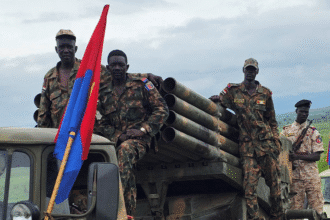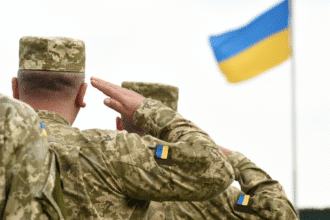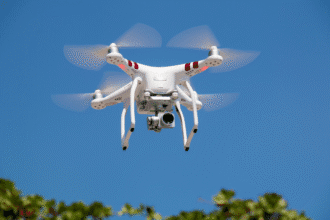Breaking news in the world tonight — Madagascar has taken a turn for the worse, as its military has overthrown the government. In the capital, Antananarivo, thousands of protesters waved and cheered as soldiers declared the suspension of key institutions and the establishment of a transitional government.
- Madagascar parliament impeachment triggers takeover.
- Madagascar institutions suspended by the military.
- Madagascar Gen Z protests trigger new polemical firestorm
- Madagascar’s president flees under military pressure.
- Protesters align with the military in Madagascar.
- Madagascar protests expose hidden tensions.
- Madagascar’s history of coups rears its ugly head again
- Madagascar Gen Z movement goes viral around the world.
- Uncertain future for Madagascar in military hands
- Madagascar at a Decisive Crossroads
- FAQ’S
Col. Michael Randrianirina appeared in front of the presidential palace and said the military had taken power to “restore order.” The presidency had unraveled within hours, and the streets filled with jubilation and confusion. As events unfolded, many citizens started questioning what the government might be covering up.
Madagascar parliament impeachment triggers takeover.
Earlier in the day, Madagascar’s parliament voted to impeach the country’s president, Andry Rajoelina. But a last-minute effort to dissolve the lower house collapsed, leaving a power vacuum. The military promptly took over, disbanding every major institution other than the lower house of parliament.
Colonel Randrianirina added that the transitional government would stay in power between one and two years. A national referendum would then be held to approve a new constitution before elections were held to restore the country’s institutions.
The announcement shocked the political class and signaled a seismic realignment of power, in what amounted to the country’s gravest political crisis in more than a decade.
Madagascar institutions suspended by the military.
The closure of democratic institutions appalled local and international opinion. France, the African Union, and other partners called on the military to respect the democratic process. French President Emmanuel Macron denied reports that a French military aircraft had flown Rajoelina out of the country.
Randrianirina said a military-led committee would rule with a civilian cabinet for the duration of that work. He also insisted the presidency would revert to an elected government after a period of transition.
Opposition figures, however, expressed doubt. A prolonged military hold on to power longer than is promised may exacerbate the political crisis, many fear.
Madagascar Gen Z protests trigger new polemical firestorm
The coup was sparked by Gen Z Madagascar, a tsunami-like wave of youth-led protests. Protests erupted on September 25 in response to chronic power cuts and a lack of water. They rapidly transformed into general protests against poverty, corruption, and the increasing sway of private Madagascar interests.
Young activists were inspired by other Gen Z uprisings in nations as varied as Nepal, Sri Lanka, Bangladesh, Kenya, and Peru. They were organized but diffuse, which made them both strong and difficult for the authorities to crush.
One demonstrator, Soavololona Faraniaina, said, “Why do we live in darkness while the rich live in light?” Her words reverberated through the crowds, mirroring the sentiments of millions of Malagasies who were seething with anger.
Madagascar’s president flees under military pressure.
As protests mounted and the military started to waver, President Andry Rajoelina left the country. A French military aircraft was reported to have taken him, but Macron refused to confirm that France was involved.”
Speaking to the nation on social media from a “safe space,” Rajoelina said that an attempted coup was underway. Online, fed-up citizens took to mocking him as “president” as his presidency began to unravel.
Elsewhere, soldiers and protesters took over the state TV headquarters. In the streets of Antananarivo, there was an electric mood that mixed anger and relief and deep uncertainty about what would come next. Read another article on the Jenin refugee camp
Protesters align with the military in Madagascar.
The balance shifted when the special CAPSAT unit of heavies would not shoot the protesters. This decision broke the deadlock. The gendarmerie and the police came soon after, leaving the president isolated and exposed.
CAPSAT, a crucial player in the 2009 coup, was key once more. This time, it played a role in shoving Rajoelina from power rather than protecting him. The time of restoration will not exceed two years by order of the military command, but it was too early to believe for many citizens.
The confluence of protesters and soldiers hastened the fall of a government more rapidly than anyone had expected.
Madagascar is the world’s biggest producer of vanilla, but almost 75 percent of its population lives in poverty. The economic crisis has also worsened in recent years, and rolling blackouts and long water cuts are a fact of daily life.
Only a third of the people in Madagascar have access to electricity, which means that many experience outages edition turns of up to eight hours or more per day. The absence of fundamental services was what many could not endure. Protesters accused the presidency of neglecting them and making several rich individuals connected to private Malagasy networks.
The coup wasn’t born overnight — it had been decades in the making.
Madagascar protests expose hidden tensions.
The United Nations said at least 22 people had been killed and more than 100 wounded in the initial days of the demonstrations. The government disputed these figures, but the unrest had obviously snowballed out of its grip.
A CAPSAT soldier was also killed in confrontations with the gendarmerie, again highlighting profound divisions within the security forces. This period hastened the process of power sliding over to the military.
The international press reported on the incident avidly. The online stream of Madagascar coverage turned into something of a phenomenon, as people from around the world attempted to comprehend what was happening in chokingly real time.
Madagascar’s history of coups rears its ugly head again
Madagascar has a history of coups and political instability. The country has seen a series of military coups since it gained independence from France in 1960. Rajoelina himself came to power in 2009 following a coup sponsored by CAPSAT that ousted then-President Marc Ravalomanana.
He continued to serve as a transitional leader, and in 2019, he was reelected, winning a second term in 2023. Rajoelina liked to style himself as a reformer. But critics say he practiced nepotism, mismanaged the government, and let his private interests in Madagascar become national policy.
The present military coup has reignited old fears and the fear of protracted chaos.
Madagascar Gen Z movement goes viral around the world.
Unlike the typical opposition party, Gen Z Madagascar is a leaderless movement. The movement is spontaneous, decentralized, and digital — rendering it difficult for authorities to silence. The protesters have rejected overtures from the government to enter into dialogue, accusing officials of obscuring an accounting of how corrupt figures pilfered and squandered national wealth.
Their strategy follows the pattern of youth revolts in Asia and Africa that have brought down long-ruling leaders. The military’s choice to side with them turned a street demonstration into an all-out transition of power.
Now, many of the country’s youth consider this their opportunity to shape Madagascar’s future.
Uncertain future for Madagascar in military hands
The military now governs Madagascar. Colonel Randrianirina and CAPSAT commanders have promised a referendum and elections within two years. Outside forces, including France, the African Union, and the United Nations, are pressuring the army to live up to its commitments.
But political observers note that transitional governments are known to stretch their timelines, leading to fears of prolonged military rule. Civil society leaders are demanding transparency and inclusion in the name of not repeating a decade’s worth of instability.
Citizens are tentatively hopeful, but their faith in the military is shaky.
Madagascar at a Decisive Crossroads
The most recent development in the world today is none other than Madagascar. In Antananarivo, people are still hugging government buildings — flags in their hands and slogans on their lips. Others are terrified, uncertain how long the military will keep power.
This is no ordinary coup. It is a turning point that has the potential to define Madagascar for generations. The presidency has been humbled, the military controls the streets — and the world is watching closely.
Many are still asking the same question that has echoed since the initial protests: What is the government hiding?
FAQ’S
- What happened in Madagascar?
Madagascar experienced a military coup after weeks of Gen Z–led protests. The army took control of the government, suspended key institutions, and promised a two-year transition.
- Who is Andry Rajoelina?
Andry Rajoelina is the former president of Madagascar. He first came to power after a 2009 coup and was re-elected in 2019. He fled the country as the military seized power.
- Why did the Madagascar protests begin?
The protests started over water and power outages but grew into a movement against corruption, poverty, and the presidency. Many young protesters demanded change.
- What role did the military play in Madagascar?
The military, especially the CAPSAT unit, refused to fire on protesters. It then dissolved major institutions and took control of the state, promising a transitional government.
- What is Gen Z Madagascar?
Gen Z Madagascar is a youth-led movement inspired by uprisings in other countries. It is decentralized, digital, and has played a central role in challenging the presidency.
- Will democracy return to Madagascar?
Military leaders said elections will follow a two-year transition. However, citizens and international observers are watching closely to ensure the timeline is respected.
- Why is Madagascar’s crisis important globally?
Madagascar’s instability affects international trade, security, and diplomacy in the Indian Ocean region. Global attention is focused on how the military handles power.
- What is the government hiding, according to protesters?
Protesters accuse the leadership of hiding corruption, wealth, and mismanagement. These accusations fueled widespread distrust in the presidency.








